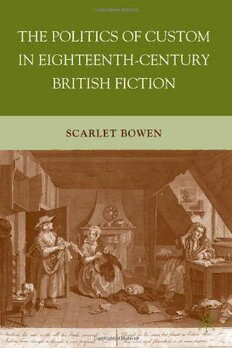
The Politics of Custom in Eighteenth-Century British Fiction PDF
238 Pages·2010·3.477 MB·English
Most books are stored in the elastic cloud where traffic is expensive. For this reason, we have a limit on daily download.
Preview The Politics of Custom in Eighteenth-Century British Fiction
Description:
The Politics of Custom in Eighteenth-Century British Fiction breaks new ground in the history of the novel by revealing both the persistent influence of popular culture and of an older, patrician model of social relations. Bowen demonstrates that this "customary culture" had effects not just on novelistic representation, but on the British imagination as a whole. Resisting the view of the novel's rise as one of increasing refinement and politeness, Bowen draws from a variety of popular sources, such as the criminal broadside, ballad, graphic prints, and pantomimes to foreground the eighteenth-century novel's cultural and social hybridity. This book further argues that representations of popular and laboring culture serve as repositories of traditional social values, strategically mobilized by authors such as Defoe, Richardson, Smollett, and Godwin in order to both impede and make palatable Britain's transition to a modern, capitalist and imperial state.
See more
The list of books you might like
Most books are stored in the elastic cloud where traffic is expensive. For this reason, we have a limit on daily download.
